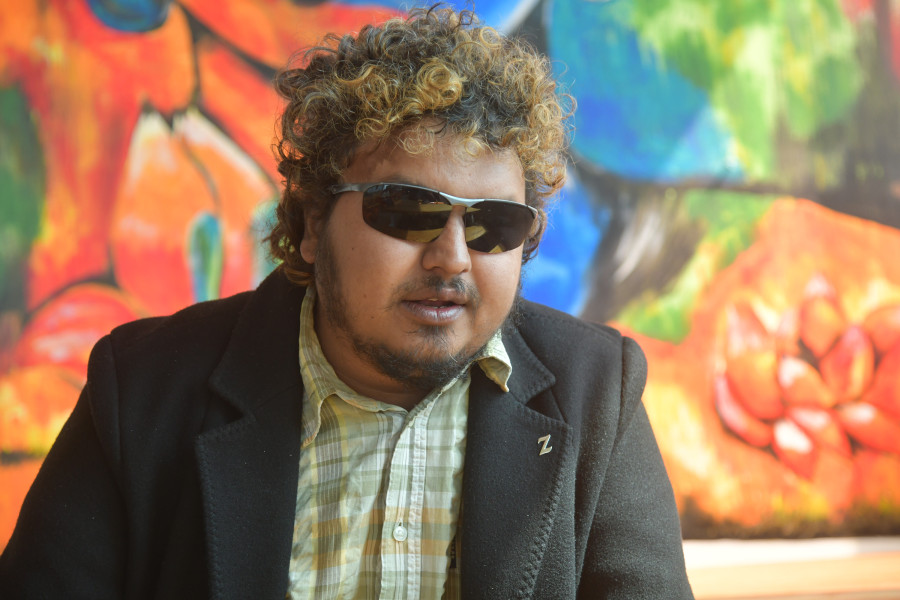Culture & Lifestyle
For Prakash Timilsina, music is his salvation
In 2008, Timilsina found fame as one of the two singers representing Nepal in an international singing TV reality show.
Tsering Ngodup Lama
Prakash Timilsina’s first ever memory is of him listening to a song on a cassette player. He was three years old at the time and it was the first time he had heard a song play from a speaker. Thus began his love affair with singing.
By the time he was nine years old, Timilsina had made up his mind to become a singer.
Today, at 33, Timilsina has recorded four albums, travelled and performed in 21 countries and won awards for his work.
If it had not been for music, he says, his life would have been so much more difficult than it already is.
When Timilsina was a year old, a flood swept away his village in Sunsari district, near Koshi Tappu Wildlife Reserve. He lost his parents to the flood and even though Timilsina survived, he suffered a serious head injury during the disaster that left him blind.
“Even though I have no memories of that time, I have been told that the flood came at dawn as the entire village was sleeping and it swept away everything. The next morning, a fisherman who had come to fish found me in his fishing net, rescued me and raised funds for my treatment,” said Timilsina. “While the head injury healed with time, the blindness was permanent.”
Timilsina’s grandmother, who was admitted at a local hospital on the day of the flooding and was thus spared, took him in and raised him.
“Soon after the flooding, having lost everything, we moved to Dharan. My grandmother worked as a domestic help to earn money and when there was no work, she had no option but to resort to begging,” said Timilsina. “It was a very difficult period in my life.”
It was in Dharan when he first heard a song play from a cassette player and fell in love with singing.
“As a blind kid, I didn’t have friends growing up and I spent a lot of time listening to songs and singing. From very early on in my life, music became my only company and my solace,” said Timilsina.
It was also very early in his life that he realised how music could be a tool for him to survive in this world where the odds are stacked against him.
Not only did he love music, Timilsina was also blessed with a good voice, something he realised when he was four or five.
People would ask him to sing and they’d give him biscuits and other eatables, things that his grandmother couldn’t afford to buy for him, in return.
“Being able to give my grandmother nice things to eat made me so happy because even though I was blind I was very well aware of how hard things were for her. When I was old enough, I started demanding a rupee for every song but this deal wasn’t very hit among people because people continued to pay me in biscuits and candies,” said Timilsina, letting out a peal of infectious laughter.
In 2008, Timilsina released his first music album Divya Dristi.
The album flopped but by the end of 2008, Timilsina had found fame as one of the two singers representing Nepal in a singing TV reality show South Asian Superstar, which was held in India. Apart from Nepal, the show had two singers each from India, Sri Lanka, Bangladesh and Pakistan.
“One of the singers representing India in the competition was Bollywood’s famed singer Neha Kakkar. I secured fourth position in the competition and the judges really liked all of my performances,” said Timilisina.
By the end of the competition, Timilsina had become quite famous.
In 2010, he was asked to lend his voice to a song Priya Timro, which had music by Rajan Raj Shiwakoti and lyrics by Prakash KC. The song went on to become a massive hit.
That year, Timilsina bagged the title Best Debutant Male Artist at Kalika FM Music Award. He also won the Best New Male Singer at Annapurna FM Music Award.
By 2010, Timilsina was becoming a known name in the Nepal music industry. He was at the peak of his career and was recording an average of two songs a year.
“In 2010, I also went to Qatar to perform for my first ever international concert. It was a good phase in my life,” said Timilsina.
He has since travelled to 21 countries to perform, launched three more albums, taking the total number of albums to four, and recorded more than 60 songs.
Three years ago, when Timilsina landed a gig as a singer at a casino of a five-star hotel in Kathmandu, his demand wasn’t as high as it used to be.
“From two recordings every week, I was doing an average of two recordings a month,” said Timilsina. “So when the casino gig came, it provided me with a much-needed steady source of income.”
Then Covid-19 hit and the casino closed.
“I used to perform thrice a week at the casino, and apart from my daily wage, I got a decent amount of money in tips and combining the two, I would make at least Rs 50,000 a month,” said Timilsina. “But since last March, the casino has been closed and that brought an end to the only steady income I have.”
Covid-19 has also impacted his other means of revenue—concerts.
“In the middle of last year, I was supposed to go to Italy for a concert but after the pandemic hit, that show got cancelled. I was supposed to go to Australia this month for a concert and that too has gotten cancelled,” said Timilsina.
But even at the peak of his career and fame, Timilsina says he never really felt that he could make a career out of singing.
“In a country like Nepal, making a living solely out of singing is still a huge challenge,” said Timilsina. “This profession demands commitment but when the results don’t match the effort you put in, one starts to drift away from this line of work. But for someone like me, that’s not an option because singing is all I can do.”
Despite his income taking a huge brunt due to the pandemic, Timilsina says he isn’t very worried.
“Ever since I was a three-year-old boy living in abject poverty in Dharan, music was my only companion. As I grew older, it was music that gave me whatever little recognition I enjoy today, some money and plenty of opportunities to travel and experience the world,” said Timilsina. “Of course things are tough now but instead of worrying, I am focusing more on bettering my craft and also working on new music. Music has pulled me through much more difficult phases in my life and I know I can rely on music to pull me through this one, too.”




 9.89°C Kathmandu
9.89°C Kathmandu

.jpg&w=200&height=120)













